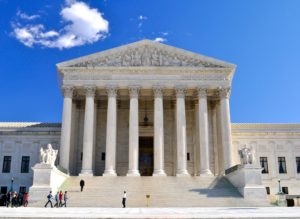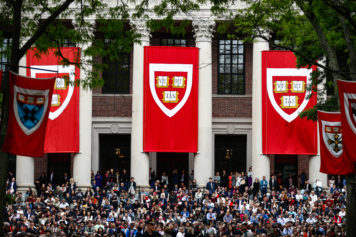
Are recent moves against affirmative action aimed at increasing Asian enrollment at elite institutions or preserving white supremacy? Photo Credit: Flickr
Back in 2014, a federal lawsuit was filed in Massachusetts on behalf of a group of Asian-Americans charging Harvard University’s undergraduate-admissions process with discriminating against Asians. The lawsuit claimed the elite university holds Asians to a higher standard than other applicants, employing a de facto quota in its admission decisions on Asian students who, despite having superior SAT scores, were disproportionately denied acceptance. Although the percentage of Asians in the U.S. population has more than doubled over the past three decades, and despite that the majority of students accepted into Harvard’s 2017 freshman class were nonwhite, the average percentage of Asian students in the school’s freshman classes has mostly hovered around 18 percent.
“Harvard’s undergraduate admissions policies and procedures have injured and continue to injure Plaintiff’s members by intentionally and improperly discriminating against them on the basis of their race and ethnicity,” read the suit.
The Department of Justice (DOJ) recently breathed new life into these allegations against Harvard by launching an investigation into the school’s admissions practices, a step that could lead to a DOJ suit against the university. Given the current conservative political environment, such a move would likely have a detrimental effect across the country on schools with affirmative action programs.
“Whenever these things come up for consideration, the tendency is for schools to actually move toward a more safe and conservative perspective,” said Hilary O. Shelton, director of the NAACP’s Washington bureau and senior vice president for advocacy and policy. “Instead of working more assertively to address the disparities in African-American participation in colleges and universities, they have a tendency to cut down on all of that.”
After citing numerous court cases, including the landmark Grutter v. Bollinger and the substantial evidence continuing to justify the need for affirmative action, Shelton clarified the relevant high court decisions “all agree that there is racial disparity and discrimination in college admissions and that much more needs to be done to address this issue.”
This acknowledged, the dynamics at play go beyond black and white. Because of admissions disparities for Asian-Americans at elite institutions like Harvard, affirmative action policies designed to remedy systemic racism are being targeted by both white conservatives and a group of Asian-Americans formed around the initial suit to highlight the alleged “penalties” of such race-conscious policies. For the conservatives, the chance to expand their longstanding attack on such policies is a can’t-miss opportunity. For Asian-Americans — be they liberal or conservative, supporters of the suit or critics — it does, at least, raise a significant question over how a policy approach partially designed to help nonwhite individuals might be harming them.
It has been argued that the apparent strengths and superior test scores of Asian candidates are commonly diminished by an undue focus on cultural or nonacademic factors. Consistently, the 2014 complaint cited a Harvard admissions official who wrote that an applicant’s “scores and application seem so typical of other Asian applications I’ve read: extraordinarily gifted in math with the opposite extreme in English.” It also referenced a director of college counseling from a Massachusetts high school who noted how admissions officers at elite universities regularly lament how Asian-American applicants all “look the same” on paper. “When Harvard calls us back and gives us a brief synopsis of why certain [Asian] kids didn’t make it, they’ll say, ‘There were so many kids in the pool that looked just like this kid.”
In an August 2017 editorial for the New Yorker, Harvard Law School professor Jeannie Suk Gersen touted the substance of the litigation regardless of how “uncomfortable” it might be for progressives, in particular, to acknowledge how a program designed to help marginalized peoples could hurt other nonwhite groups. Still, Gersen pointed out it would be a “serious error” to assume that “in order to stop discrimination against Asian applicants, race-conscious affirmative action must end.” To the contrary, she stressed that “continued use of affirmative action of the kind upheld by the Supreme Court is perfectly compatible with tackling the discrimination at issue. The problem is not race-conscious holistic review; rather, it is the added, sub-rosa deployment of racial balancing in a manner that keeps the number of Asians so artificially low relative to whites who are less strong on academic measures.”
Therefore, reasoned Gersen, a race-conscious affirmative action is needed to “address the historic discrimination and underrepresentation of blacks and Latinos, in combination with far less severity in the favoring of whites relative to Asians.” In other words, keep the current and justifiable preferences for Black students and Latinos while eliminating the penalty for Asian-Americans.
While stressing the “most effective affirmative action and equal opportunity programs” are those that include the consideration of a diversity of factors alongside race, Shelton acknowledged “it is unfair to try to term Asian-Americans as those who should not receive an opportunity to go to colleges or universities, or should somehow be tempered in their acceptance.” That, he added, “would simply be unfair as well.”
Some take it further, contending the impetus behind the suit is far more about politics than any alleged penalties or quotas. “The issue hiding in plain sight is not how the elite admissions system keeps Asians out,” recently wrote Marie Myung-Ok Lee, for NBC’s online news platform Think. The Columbia University writing teacher insisted “it is more about how it is largely rigged to keep white students — who are often staggeringly underqualified — in, by any means necessary.”
Lee pointed to the thinly veiled right-wing orchestration of the Harvard suit by Houston-based conservative strategist Edward Blum and his nonprofit Students for Fair Admissions. Blum’s organization has filed multiple lawsuits in the past decade challenging affirmative action policies, including the Harvard suit and another against the U.S. Department of Education. Lee took issue with the group’s recruiting tactics, which commonly feature a disillusioned Asian student wondering if her admissions denial was based on race, before noting that even if Harvard is found guilty of denying admission to Asian students based on racial quotas, “reparative increases of Asian American admissions would need to come from subtracting the spots from underqualified whites, not from supposed affirmative action candidates.” This is only logical, implied Lee, given the large numbers of white athletes and rich alumni children with substandard academic and SAT credentials who commonly enjoy admissions advantages in elite schools across the country.
Harvard’s deployment of possible quotas needs to be dealt with, concluded Lee, “but not via false allies who exploit legitimate grievances to maintain white mediocrity at the expense of qualified blacks, Latinos, Native Americans and, yes, Asian-Americans.”

